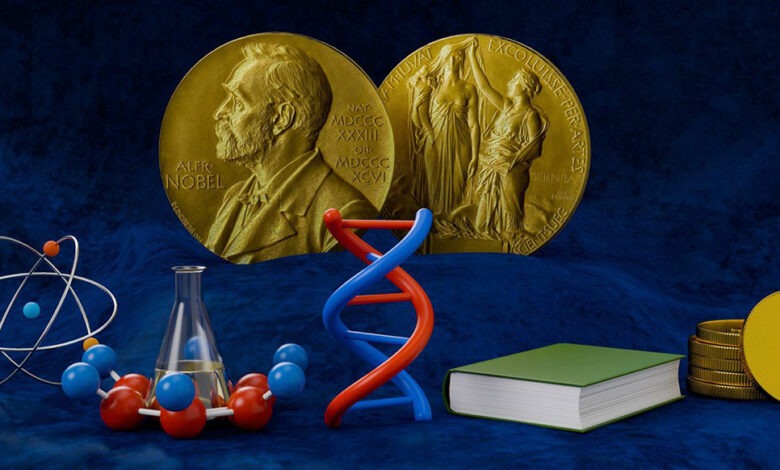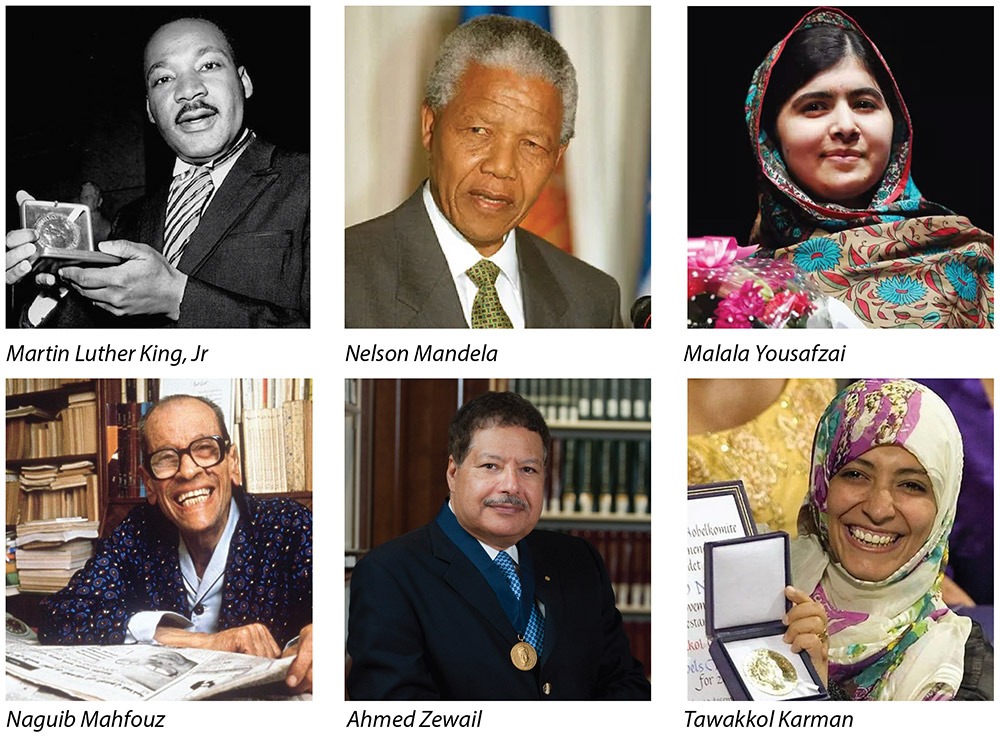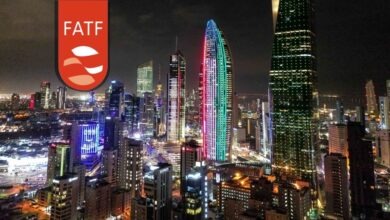Why the Nobel Prize continues to hold global significance

By Tareq Yousef AlShumaimry
Former Secretary-General of the Commercial Arbitration Centre of the Gulf Cooperation Council
The Nobel Prize is a set of prestigious international awards given annually since 1901 for outstanding achievements in various fields. Established by Swedish inventor (of dynamite) and entrepreneur Alfred Nobel, who left a large portion of his fortune to establish the prizes. The prizes are awarded in Physics, Chemistry, Physiology or Medicine, Literature, Peace, and, since 1968, Economic Sciences.
The Nobel Prize categories are
1. Nobel Prize in Physics – awarded by the Royal Swedish Academy of Sciences.
2. Nobel Prize in Chemistry – awarded by the Royal Swedish Academy of Sciences.
3. Nobel Prize in Medicine – awarded by the Karolinska Institutet in Sweden.
4. Nobel Prize in Literature – awarded by the Swedish Academy.
5. Nobel Prize in Peace – awarded by the Norwegian Nobel Committee (in Oslo, Norway).
6. Nobel Prize in Economic Sciences – added in 1968 and awarded by the Royal Swedish Academy of Sciences.
The prizes are announced annually in October and awarded on December 10 of the same year (the anniversary of Alfred Nobel’s death) in Stockholm, Sweden, with the exception of the Peace Prize, which is awarded in Oslo.
The prize consists of a gold medal and a monetary award (the value of which varies annually, and has reached approximately $1 million in recent years). The prize may be awarded to a maximum of three people in each category. The Peace Prize may be awarded to individuals or organizations (such as the United Nations or the International Committee of the Red Cross). The Nobel Prize is considered one of the world’s most prestigious honors, and prizes (especially those for literature and peace) often spark controversy over the selection of winners.
Alfred Nobel established the Nobel Prize out of regret and a desire to leave a positive legacy after his death, especially after seeing how his invention (dynamite) was used in wars and destruction. Alfred Nobel invented dynamite in 1867, and intended it to be used in engineering and construction (such as blasting mountains to build roads). However, dynamite was widely used in wars, leaving Nobel feeling guilty for causing increased violence. The Incident That Changed His Life: In 1888, Nobel’s brother (Ludvig Nobel) died. However, some newspapers mistakenly published an obituary for Alfred Nobel titled “The Merchant of Death is Dead,” describing him as a wealthy arms dealer and destroyer.
This caused him to reflect on his reputation after his death, and he decided to leave a positive legacy for humanity. His Last Will (1895): – A year before his death, Alfred Nobel wrote his will, in which he set aside 94% of his fortune (about 31 million Swedish kronor at the time, equivalent to billions today to establish prizes for contributions to humanity. He intended the prizes to reward achievements in physics, chemistry, medicine, literature, and peace (the Economics Prize was later added).
The purpose of the Nobel Prize, as stated by Alfred Nobel: “The prizes should be awarded to those who have conferred the greatest benefit on mankind during the preceding year.” He wanted to be remembered as a person who contributed to peace and scientific progress, not as a “merchant of death.” This transformation of Alfred Nobel shows that he invented dynamite for construction, but it became a destructive weapon. He turned his fortune into a prize that rewarded humanitarian achievements.
Thus, his reputation transformed from “merchant of death” to a symbol of scientific excellence and world peace. Reasons for Alfred Nobel’s choice of these disciplines: – Sciences (physics, chemistry, medicine) because he was a scientist and inventor and valued scientific research. – Literature, because he was passionate about writing and poetry (he wrote plays and poems). – Peace, because he wanted to make up for the damage caused by his military invention. Nomination Procedure for the Nobel Prize: Nominees for the Nobel Prize are nominated through a confidential and rigorous process overseen by the Nobel Committees in each field.
No one may nominate themselves or apply directly for the prize. Nominations are made according to the following procedures:
1. Who is Eligible to Nominate? Nominations depend on the field and are limited to specific categories, including: – Nobel Prize in Physics, Chemistry, and Economics: – Members of the Royal Swedish Academy of Sciences. – Previous Nobel laureates in these fields. – University professors in related disciplines (carefully selected). – Nobel Prize in Medicine: – Members of the Nobel Committee at the Karolinska Institutet. – Medical experts and academics from accredited universities. – Nobel Prize in Literature: – Members of the Swedish Academy. – Professors of literature and languages. – Presidents of well-known writers’ associations. – The Nobel Peace Prize: – Members of national parliaments and governments. – Professors of law or political science. – Previous Peace Prize laureates. – Directors of peace research institutes.
2. How to Nominate – Confidential nominations are sent each year from those eligible to nominate names. – Nominations must be submitted before January 31 of each year (for prizes announced in October of the previous year). – A detailed letter explaining the nominee’s achievements and their significance is required.
3. Confidentiality of Nominations – The names of nominees are not publicly revealed for 50 years. – Nominations are made annually (Nominations for the Nobel Peace Prize may receive hundreds of nominations annually).
4. Selection Criteria – Originality and Impact: The work must have made a clear difference in its field. – Benefit to humanity, especially in the medicine and peace prizes. – Novelty: The prize is not usually awarded for very old discoveries unless their impact is evident recently.
5 – Exceptions – In rare cases, committees may request the opinions of external experts. – The prize is not awarded posthumously (unless the winner dies after the announcement but before the award). Example of a Nomination – When Albert Einstein was nominated for the Nobel Prize in Physics, Max Planck (a previous laureate) did so in 1919, and Einstein won in 1921. Perhaps the importance of the Nobel Prize lies in its prestige, as it is not subject to political or media pressure, and winning is based solely on merit. A number of Arabs and Muslims have won Nobel Prizes in various fields.

The following is a list of the most prominent winners:
1. Nobel Peace Prize – Anwar Sadat (Egypt, 1978): – Received for his efforts to achieve peace with Israel and sign the Camp David Accords. – The Tunisian National Dialogue Quartet (Tunisia, 2015): – A group of Tunisian organizations that assisted in the democratic transition after the revolution (the Tunisian General Labor Union, the Confederation of Industry, Trade, the Tunisian League for the Defense of Human Rights, and the Bar Association).
2. Nobel Prize in Literature – Naguib Mahfouz (Egypt, 1988): – The first Arab to win the Nobel Prize in Literature, for his novels such as “The Cairo Trilogy” and “Children of Gebelawi.”
3. Nobel Prize in Chemistry – Ahmed Zewail (Egypt/USA, 1999): – Received for his development of the femtosecond microscope, which photographs the movement of atoms in chemical reactions.
4. Nobel Prize in Physics – Abdus Salam (Pakistan, 1979) (Non-Arab Muslim laureates) – A Muslim scientist (of the Ahmadiyya sect) who shared the prize for his theory of the electroweak force in particle physics.
5. Nobel Peace Prize (Non-Arab Muslim laureates) – Malala Yousafzai (Pakistan, 2014): – The youngest Nobel laureate (17 years old) for her struggle for girls’ education.
6. Nobel Peace Prize – Muhammad Yunus (Bangladesh, 2006) (Non-Arab Muslim laureates) – Founder of the Grameen Bank, a microfinance institution dedicated to combating poverty
7. Mohamed ElBaradei, former head of the International Atomic Energy Agency (IAEA), was awarded the 2005 Nobel Peace Prize. He shared the prize with the IAEA for their work in preventing nuclear energy from being used for military purposes and ensuring its safe use for peaceful applicationsg poverty.
8. Yasser Arafat was awarded the 1994 Nobel Peace Prize, for his efforts to create peace in the Middle East.
9. Tawakkol Karman, a Yemeni journalist, was the first woman to win the Nobel Peace Prize from the Arab world. She was awarded the prize for her non-violent efforts to promote peace and their struggle for women’s rights.
Some winners, such as Dr. Ahmed Zewail and Dr. Mohamed Abdel Salam, received their scientific awards through their affiliation with foreign institutions (Zewail in America, Abdel Salam in Europe). Dr. Naguib Mahfouz is the only Arab to have won the Nobel Prize in Literature to date. No Arab or Muslim scientist has ever won a Nobel Prize in Medicine or Economics until 2024. These names reflect the influence of Arabs and Muslims in the fields of peace, literature, and science, although the number of winners remains limited compared to other regions of the world.
Some famous winners: – Nobel Peace Prize: Martin Luther King, Jr., Nelson Mandela, Malala Yousafzai. – Literature: Orhan Pamuk, Turkish novelist. – Physics: Albert Einstein, Marie Curie (the first woman to win a Nobel Prize). – Chemistry: Marie Curie (the only woman to win two prizes in two different fields: physics and chemistry).
1. Confidentiality in Nomination and Selection – Nominations are completely confidential: Nominators and the public are not allowed to know who has been nominated until 50 years have passed (archives are open to researchers only). – Even the laureates themselves do not know they have been nominated until they win. – Nobel Committees are closed: – Each prize has an independent committee (such as the Nobel Peace Committee in Oslo and the science committees in Stockholm). – Committee members are strictly confidential and are prohibited from disclosing internal discussions.
Anonymity of nominees: – The identities of those submitting nominations (such as professors or previous laureates) are not made public. There are rare exceptions to breaking confidentiality. In limited cases, some nominations may be revealed, such as when an entity (such as a university or government) announces that it has nominated someone, or if a previous laureate publishes their nomination (as Desmond Tutu did when he revealed he had nominated Malala, and as also recently when the Pakistani government announced its intention to nominate US President Donald Trump for this year’s Nobel Peace Prize). However, these are rare cases and do not affect the confidentiality of the main committee.
2. Credibility, Impartiality, and Strict Nomination Requirements: Nominations are accepted only from specific entities (senior academics, previous laureates, and parliamentarians in the case of the Nobel Peace Prize). – No one may nominate themselves or pressure individuals or entities to win. – Rigorous scientific and academic judging. In science prizes (such as physics or chemistry), research is evaluated by specialized experts, while in literature, authors’ works are thoroughly studied to ensure their quality and impact.
Political biases are excluded, the most recent example being the Nobel Peace Prize, which sometimes generates controversy (the award was given to former US President Barack Obama in 2009 before he had achieved any tangible achievements). However, the committees insist that the awarding criteria follow the original criteria of Alfred Nobel’s will for his reasons for awarding the prize. “The prizes should be awarded to those who have conferred the greatest benefit on humanity during the preceding year.” In science, the prize is awarded only for proven discoveries with a clear impact (e.g., the 2020 CRISPR Prize for gene editing).
Commercial or media nominations are not permitted, and advertising campaigns or media pressure will not influence the decision, as the system relies on confidential academic evaluation. – In 2018, the Literature Prize was postponed due to a corruption scandal at the Swedish Academy, demonstrating that the institution is taking steps to ensure integrity. – It is important to note that Nobel Prize committees sometimes delay awarding prizes because some scientific discoveries take decades to be confirmed (such as the 2013 Higgs boson award, which was discovered in 1964) in physics, which proved the validity of the physical theory of elementary particles.
Categories eligible for submitting a nomination for the Nobel Peace Prize:
1. Members of national governments and parliaments: – Heads of state/government. – Ministers (especially ministers of foreign affairs and justice). – Members of national committees of states and their national appointees to the Permanent Court of International Arbitration.
2. Members of the International Court of Justice (ICJ) and the Permanent Court of Arbitration (PCA): – Judges and officials of these courts.
3. Former Nobel Peace Prize Laureates: – Individuals or organizations may be nominated.
4. Members of the International Committee of the Red Cross (ICRC) and the International Red Cross and Red Crescent Movement: – For their historic role in humanitarian peace.
5. University professors in specific fields: – Professors of international law, political science, and history. – Heads of peace research institutes.
6. Directors of specialized peace and research institutions: – Such as the Stockholm International Peace Research Institute (SIPRI).
7. The Secretary-General of the United Nations and senior officials of international organizations: – Such as the Secretary-General of the League of Arab States, the Secretary-General of the Gulf Cooperation Council, or the African Union. It should be noted in this regard that private individuals or the general public are not permitted to submit nominations.
No one can nominate themselves, and nominations from entities that are not academically or politically recognized are not accepted. Examples of entities that have previously submitted nominations for the Nobel Peace Prize: –
Governments: Norway nominated the Organization for the Prohibition of Chemical Weapons (OPCW) and won in 2013. – Previous winners: Al Gore, former US Vice President (and 2007 winner), was nominated by environmental activists. – International organizations: The United Nations nominated Malala Yousafzai and won in 2014.
It is also worth noting that, 50 years after the Nobel Peace Prize nominations, the official archives of the prize are open, allowing the public to view the nominees who did not win.
Famous Political Figures – Winston Churchill (British Prime Minister during World War II) was nominated several times (for example, in 1951), but later won the Nobel Prize for Literature (1953), not the Nobel Peace Prize. – Charles de Gaulle (President of France) was nominated for his efforts to end the Algerian War, but did not win. – Jawaharlal Nehru (first Prime Minister of India) was nominated in the 1950s for his role in the Non-Aligned Movement, but did not win. – Vladimir Lenin (leader of the Bolshevik Revolution) was nominated in 1918 by Norwegian socialists, but the committee rejected him. – Adolf Hitler (a historical surprise) was nominated in 1939 by a Swedish parliament member (as a political joke), and the committee immediately withdrew the nomination. Mahatma Gandhi was nominated five times (1937–1948), but never won (after his death, the committee apologized for this historical omission). Amnesty International was nominated several times before finally winning in 1977. The International League of the Red Cross: It was nominated several times before winning three awards (1917, 1944, 1963).
Arab and Islamic nominations were unsuccessful. Egyptian President Gamal Abdel Nasser (Egypt) was nominated in the 1960s for his role in the Non-Aligned Movement, but the committee preferred others.
Perhaps the reasons for not winning the Nobel Peace Prize include: – Political reasons: Some nominations are rejected due to geopolitical biases. – The timing of the nomination is wrong, or the nominee’s achievements may not have been clear at the time (such as early nominations for women’s rights before they became a global issue). –
Competition is fierce. In some years, there are more influential candidates. The secret archives are open after 50 years on the Nobel Foundation’s official website. Throughout history, many prominent figures who deserved the Nobel Peace Prize have been wronged, whether Arab, regional, or international.
As of 2024, there have been 627 Nobel Prizes awarded to 1,012 individuals and organizations. This includes the Nobel Memorial Prize in Economic Sciences, which was established later. Some individuals have received the prize more than once, resulting in a total of 976 individuals and 28 organizations
Political factors, committee criteria, or historical contexts prevented them from winning. Perhaps the Nobel Peace Prize is not always a measure of justice.
Many Kuwaiti and Gulf figures have played a role and contributed to peace. In this regard, we may recall the role of the late Sheikh Sabah Al-Ahmad Al-Jaber Al-Sabah in diplomacy, peace, and resolving disputes between countries, from his tenure as Minister of Foreign Affairs until his assumption of the position of Emir of the State of Kuwait.
We also remember prominent Kuwaiti figures in literature, medicine, and science, as well as others who have made significant contributions, research, and achievements in their fields of expertise.

Tareq Yousef AlShumaimry, served as Chairman of the Finance Committee and Chairman of the General Budget Committee of the Permanent Court of Arbitration in The Hague (PCA) and an observer in the Administrative Council of the Court and the Consular at International Court of Justice (ICJ) and the Embassy of the State of Kuwait in the Netherlands during this period from 2013 to 2020. Email: tareq@alshumaimry.com












